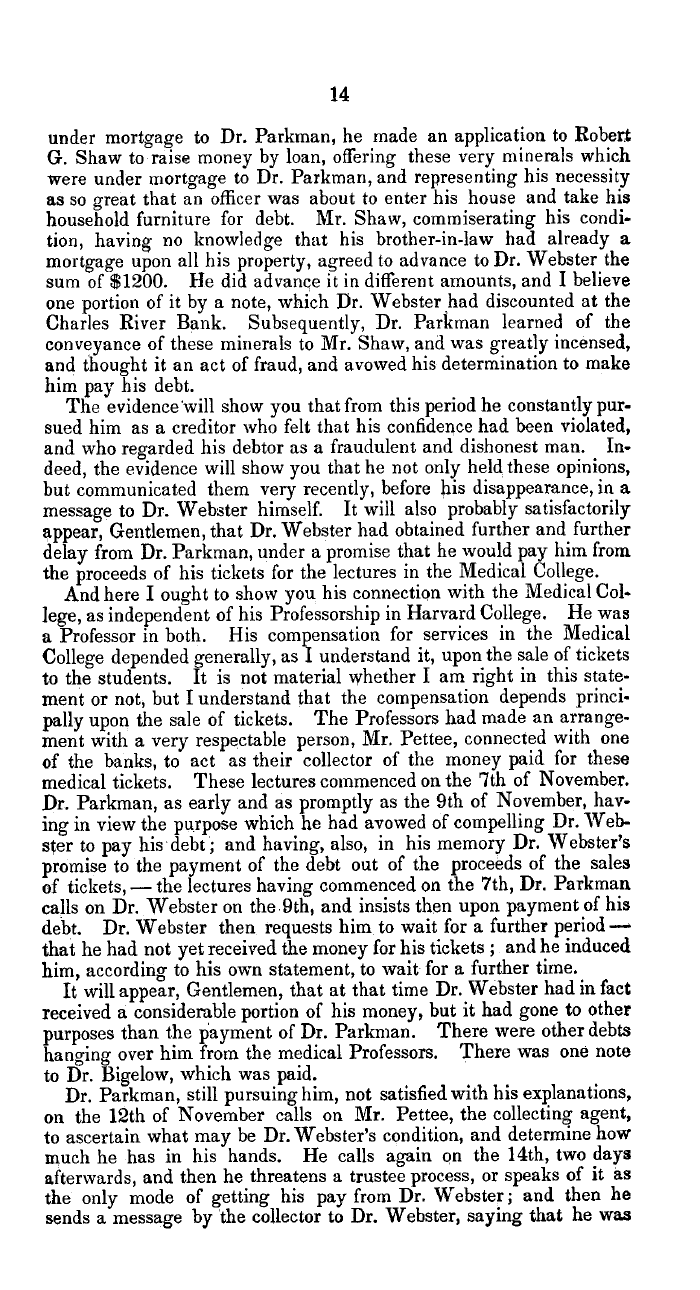|
14
under mortgage to Dr. Parkman, he made an application to Robert
G. Shaw to raise money by loan, offering these very minerals which
were under mortgage to Dr. Parkman, and representing his necessity
as so great that an officer was about to enter his house and take his
household furniture for debt. Mr. Shaw, commiserating his condi-
tion, having no knowledge that his brother-in-law had already a
mortgage upon all his property, agreed to advance to Dr. Webster the
sum of $1200. He did advance it in different amounts, and I believe
one portion of it by a note, which Dr. Webster had discounted at the
Charles River Bank. Subsequently, Dr. Parkman learned of the
conveyance of these minerals to Mr. Shaw, and was greatly incensed,
and thought it an act of fraud, and avowed his determination to make
him pay his debt.
The evidence'will show you that from this period he constantly pur-
sued him as a creditor who felt that his confidence had been violated,
and who regarded his debtor as a fraudulent and dishonest man. In-
deed, the evidence will show you that he not only held these opinions,
but communicated them very recently, before his disappearance, in a
message to Dr. Webster himself. It will also probably satisfactorily
appear, Gentlemen, that Dr. Webster had obtained further and further
delay from Dr. Parkman, under a promise that he would pay him from
the proceeds of his tickets for the lectures in the Medical College.
And here I ought to show you his connection with the Medical Col.
lege, as independent of his Professorship in Harvard College. He was
a Professor in both. His compensation for services in the Medical
College depended generally, as I understand it, upon the sale of tickets
to the students. It is not material whether I am right in this state-
ment or not, but I understand that the compensation depends princi-
pally upon the sale of tickets. The Professors had made an arrange-
ment with a very respectable person, Mr. Pettee, connected with one
of the banks, to act as their collector of the money paid for these
medical tickets. These lectures commenced on the 7th of November.
Dr. Parkman, as early and as promptly as the 9th of November, hav-
ing in view the purpose which he had avowed of compelling Dr. Web-
seer to pay his debt; and having, also, in his memory Dr. Webster's
promise to the payment of the debt out of the proceeds of the sales
of tickets, - the lectures having commenced on the 7th, Dr. Parkman
calls on Dr. Webster on the 9th, and insists then upon payment of his
debt. Dr. Webster then requests him to wait for a further period -
that he had not yet received the money for his tickets ; and he induced
him, according to his own statement, to wait for a further time.
It will appear, Gentlemen, that at that time Dr. Webster had in fact
received a considerable portion of his money, but it had gone to other
purposes than the payment of Dr. Parkman. There were other debts
hanging over him from the medical Professors. There was one note
to Dr. Bigelow, which was paid.
Dr. Parkman, still pursuing him, not satisfied with his explanations,
on the 12th of November calls on Mr. Pettee, the collecting agent,
to ascertain what may be Dr. Webster's condition, and determine how
much he has in his hands. He calls again on the 14th, two days
afterwards, and then he threatens a trustee process, or speaks of it as
the only mode of getting his pay from Dr. W ebster; and then he
sends a message by 'the collector to Dr. Webster, saying that he was
|

